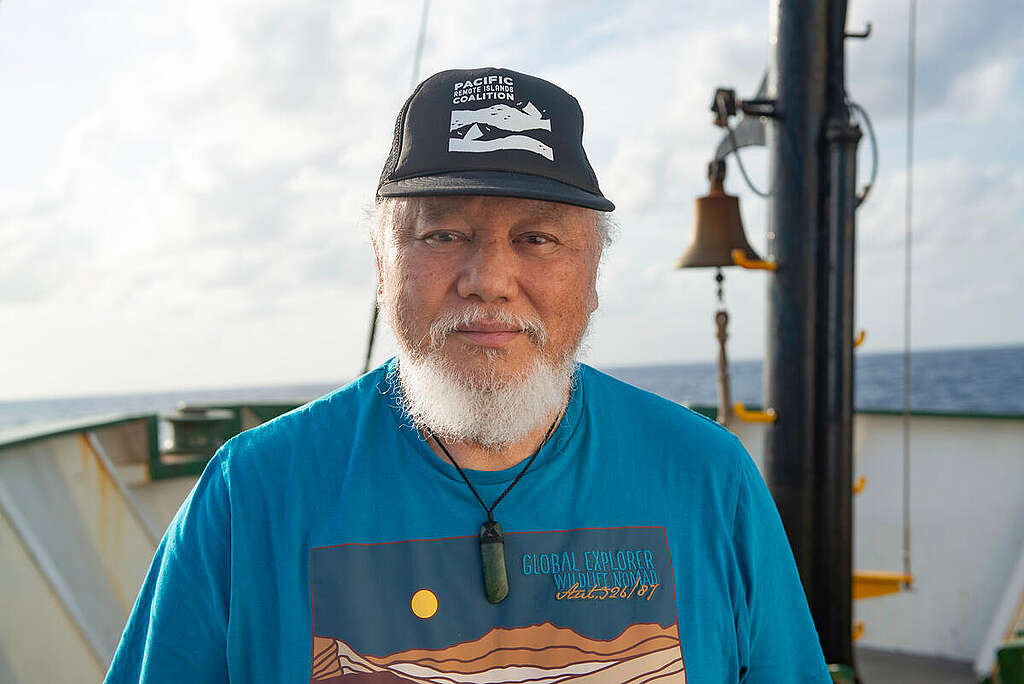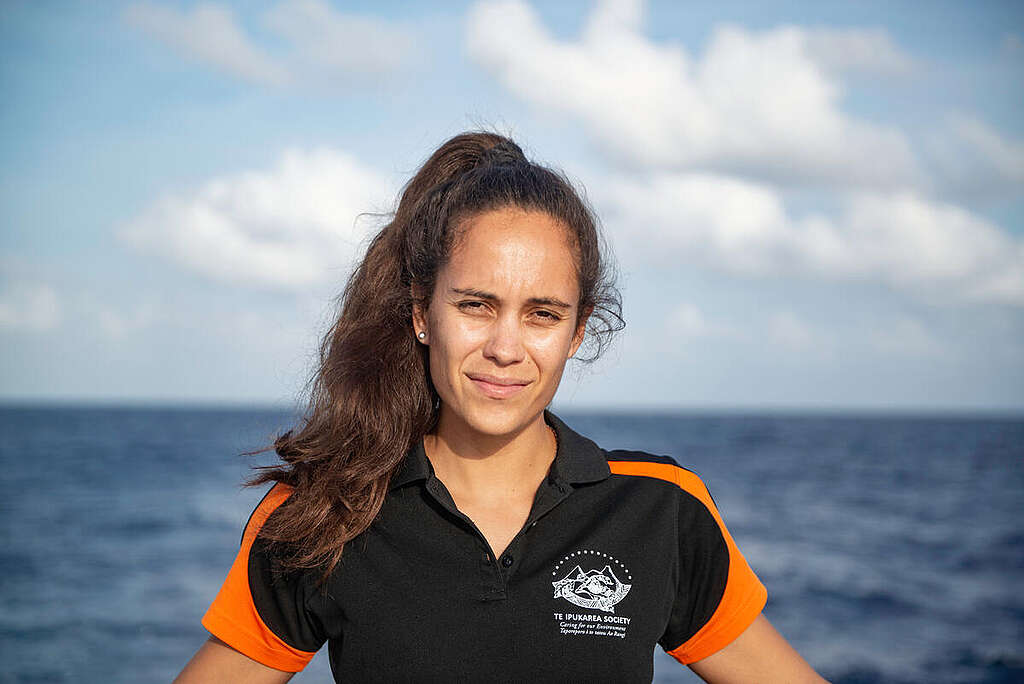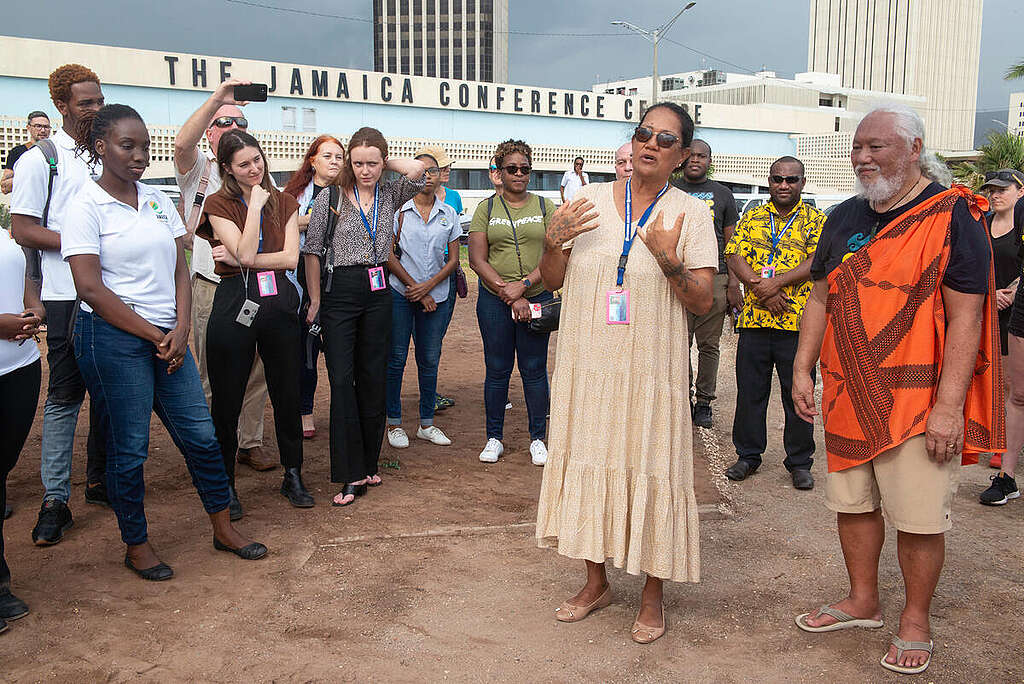When it comes to the campaign to stop deep sea mining, the stakes may be highest for Pacific communities. One of the biggest deep sea mining target zones is in the Pacific Ocean: the Clarion-Clipperton zone. This is where the industry wants to start mining operations.
For too long, the voices of Pacific Indigenous communities have not been heard at the International Seabed Authority (ISA), when this UN body was discussing the future of their ocean. To help ensure that world leaders hear messages from the Pacific and understand the growing movement to stop deep sea mining, let's meet some representatives from the Pacific and take a closer look at why the stakes are so high for them:
'The seabed is the source of creation and we need to take care of everything that precedes us'-Solomon Pili Kaho'Ohalahala
Solomon Pili Kahoʻohalahala, known as Uncle Sol, was a member of the Greenpeace International delegation at the ISA meetings in July because Hawaii is one of the closest territories to the Clarion – Clipperton zone. He is a native Hawaiian Elder of the Papahānaumokuākea Marine National Monument Advisory Council and Native Hawaiian Cultural Working Group.

"The story of our creation begins in the ocean in the deep seas. Our role as humanity is to create balance and to care for all things that precede us, even the coral polyp. We are here at the ISA to discuss our connection to the deep sea and share this perspective so that this can be included in this discussion on launching an industry that will encroach into the place of creation itself. We are here to say no to deep sea mining and no to the destruction of our cultural heritage," said Uncle Sol in a video message projected in various cities around the world during the ISA meetings.
Hawaii is not a member state at the International Seabed Authority as a consequence of its political and colonial history. Neither is the United States because it didn't ratify the United Nations Convention of the Law of the Sea. Nevertheless, the livelihood, history and traditions of the Indigenous peoples from Hawaii are closely linked to the ocean and Hawaii would be on the frontline of the impacts if deep sea mining should start.
The latest chapter in a history of colonisation
With deep sea mining exploration contracts monopolised by a handful of companies headquartered in the Global North, this industry represents yet another colonial intrusion on Pacific communities. During the ISA meetings in July, with the future of the oceans under threat, Uncle Sol reflected on aspects of the colonial history from Hawaii:
In the 19th century, the Queen of Hawaii was overthrown and imprisoned in her own palace, due to an illegal act of war from the United States against the peaceful islands of Hawaii. She took advantage of this to translate the Hawaiian genealogy stories and chants into English, with the perspective that the chants would have relevance in the future and attract scientists' interests to look into that. When looking into the chants, it says that all life on Earth comes from the deep sea, that the deep sea is the source of creation, thanks to the energy stored in the seabed, the wale wale. The Hawaiian story tells that the first creature to emerge is the coral polyp, uku ko'ako'a. From that, all other creatures would emerge, from the vertical water column to the shallow waters of the oceans, onto the land, into hills and mountains and even to the creatures taking flights.
Uncle Sol believes that the state members and the ISA Secretariat need to hear and understand that Hawaiian Indigenous people consider the deep sea as their home, their place, and their beginning. At the moment, this deep cultural connection is neither heard nor understood. The only reference to culture policy about the high seas is what is called the "underwater cultural heritage", which refers to any object that can be found under the sea, from a sunken vessel to submerged archaeology. This is what culture is to the world leaders at the ISA, which is totally different from what it refers to for Indigenous people from the Pacific -a consequence of them being excluded from the discussion for way too long.
"Humans were not brought into this place until the Earth was already created with all things, in a perfect balance. Hence, our responsibility is to care for everything that precedes us, down to the eldest of our ancestors which is the polyp coral. The way Indigenous people from the Pacific view the world is that we have to care for this balance on Honua (the Earth) especially because all of this took million years to be complete and was done so we can be the beneficiaries," said Uncle Sol.
People from the Pacific consider the ocean as central to life, but today it is in the hands of the members of the ISA to take care of it. Nevertheless, people from many Pacific communities - including Hawaiian Indigenous people - have been excluded from the discussion for years about whether or not deep sea mining should be allowed. Now, the deep sea mining industry wants to "delve into the place of creation, putting it all at risk", continued Uncle Sol.
'We do not want the deep sea mining industry to tarnish the authenticity of our culture'-Alanna Matamaru Smith
Alanna Matamaru Smith is from the Cook Islands and she is the Director at the Te Ipukarea Society, which received their observer status at the 28th International Seabed Authority in March. She traveled to the ISA to be made aware of discussion and decisions pertaining to activity in the high seas and bring the voices from different communities to the table.

Since 2015, the Cook Islands has been represented at the ISA meetings. Its government is in a joint venture with the Belgium deep sea mining company, GSR. There is a big governmental interest in mining the seabed for polymetallic nodules. Currently, Cook Islands are in the second year of a five-year exploration phase within national waters. In the lead up to the start of the exploration phase, Te Ipukarea Society observed unbalanced messaging to community groups from the government who presented an emphasis on the potential financial gains with little attention towards the environmental risks from the industry.
Smith thinks that governments present at the ISA meeting would understand why deep sea mining is a dangerous threat to Pacific Indigenous communities if they could understand that the ocean informs every aspect of Pacific peoples' culture and that their culture is their identity.
'I feel a lot of frustration and pain towards the International Seabed Authority process'-Hinano Murphy
Hinano Murphy is a representative of the Tetiaroa Society, in Tahiti, French Polynesia. Hinano Murphy is the Cultural Director of this organization. For Murphy, the ISA process is not inclusive: it is just a small group of people gathered in a room in Kingston who decide on the future of the Pacific Ocean, which is part of their DNA. Moreover, the ISA process is too short to have a genuinely inclusive process for the Pacific communities to properly understand what is going on and express their concerns.
"To us, people from Tahiti, the ocean is life and we need to defend life. People from the Pacific eat ocean, live ocean, breathe ocean," Murphy said.
For Pacific communities like Murphy's, for whom the ocean is deeply connected to their being, it is felt as a profound disrespect that such ways of belief and living are totally brushed aside by governments at the ISA.
"Ocean is life, it is part of our DNA," Murphy added.

Oceans are already in great danger, suffering from overfishing, plastic pollution, offshore drilling, and global warming. It is absurd to add deep sea mining on top of that when science says damages could be irreversible on marine ecosystems. Discussions during the 28th session of the International Seabed Authority meeting mainly focused on how to extract those polymetallic nodules from the seabed that the world has deemed to belong to nobody in the law of the high seas. The greedy deep sea mining industry is looking at the oceans and the high seas like it is free for all. Like they could come and simply help themselves.
Voices from the Pacific need to be elevated. Many Pacific representatives traveled to Kingston, Jamaica, to make sure the integrity of the marine biodiversity is maintained. For Indigenous people from the Pacific, the deep sea is sacred and revered as the place of creation. It's important that we hear their stories, read their words, and amplify their messages.
For too many years, people from the Pacific have been excluded from discussions about deep sea mining. Nevertheless, the biggest deep sea mining target zone is in the Pacific.
Their voices need to be heard. Share this video
#StopDeepSeaMining pic.twitter.com/lO8nSPGnGf
— Greenpeace Aotearoa (@GreenpeaceNZ) July 27, 2023
Maud Oyonarte is the global digital lead for the Greenpeace International Stop Deep Sea Mining campaign, based in Paris, France






